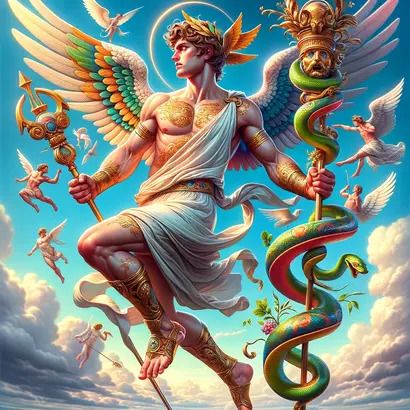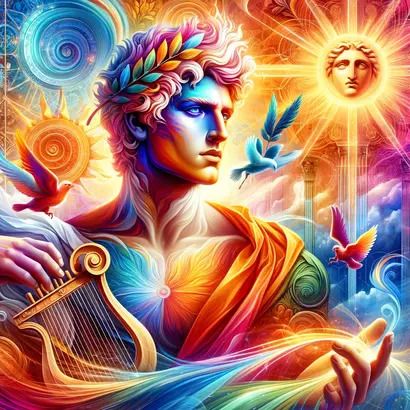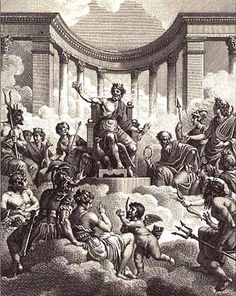
Hermes
☤ Hermes :: The Messenger of the Gods
Hermes is the winged herald and messenger of the Olympian gods. In addition, he is also a divine trickster, and the god of roads, flocks, commerce, and thieves. A precocious newborn, he invented the lyre and stole Apollo’s cattle on the very first day of his life. Hermes was the only Olympian capable of crossing the border between the living and the dead.
Hermes’ Role
Hermes' Name
Most scholars think that Hermes’ name derives from the Greek word herma, which means “a heap of stones” or “cairn.” Cairns were a common sight in the Ancient world, serving as trail- or boundary-markers. Some say that the first cairn was erected by the gods, when they cast all their stones in favor of Hermes, during his trial for slaying Argus Panoptes.
Hermes' Portrayal and Symbolism
Archaic artists portrayed Hermes as a mature bearded man. However, later on, he was represented as an athletically built nude youth, immediately recognizable by four attributes: a broad-brimmed hat (petasos), winged sandals (talaria), a purse, and a herald’s wand (kerykeion, or caduceus in Latin). Hermes’ wand – a short-winged staff, entangled by two identical serpents – had magical powers, bringing sleep upon people or rousing them from it. It is very similar and frequently confused with the Rod of Asclepius, which is why Hermes’ wand is often incorrectly used as a symbol of medicine.
Hermes' Epithets
According to some myths, Hermes wasn’t only a messenger of the gods, but also the inventor of speech. As such, he is often associated with oratory or interpretation. In Greece, an interpreter was called hermeneus, and today the science of interpretation is known as hermeneutics.
Hermes was the only Olympian capable of crossing the boundary between the living and the dead and carrying the souls of the dead in Hades. In time, he came to be known as “the conductor” or “the leader of souls.” People also called him “patron of travelers and thieves,” “shepherd of men,” “trickster,” and “Argus-slayer.”
Hermes’ Life and Deeds
Hermes, a Precocious Child
Hermes was the son of Zeus and Maia, the oldest of the seven Pleiades. He was born in a cave in Mount Cyllene in Arcadia at dawn. By noon he was able to invent the lyre and play a hymn celebrating his own birth on it. That very same evening, for reasons unknown, he stole the cattle of Apollo. Afterward, he came back and innocently tucked himself up in his cradle.
Hermes and Apollo
To invent the lyre, Hermes killed a tortoise and scooped the flesh out of its shell. Then, honoring the Pleiades, he stretched seven strings of sheep-gut over the empty shell. Once he found out who had stolen his cattle, Apollo was so angry at Hermes that bad things might have happened if Hermes hadn’t appeased Apollo with a lyre- accompanied song. In exchange for it, Apollo forgave his little brother everything and swore to be his closest friend forevermore. Some say that as a token of this promise, Apollo gifted Hermes with the latter one’s most emblematic object: the caduceus.
Hermes, a Darling of the Gods
By all accounts, Hermes was a darling of the gods. Artemis supposedly taught him how to hunt and Pan how to play the pipes. He was the one who guided Persephone back to her mother, Demeter. Above all, Hermes was very close with his father, acting in many of his affairs as Zeus’ wingman. Most famously, he beheaded the hundred-eyed giant Argus Panoptes, previously sent by Hera to closely watch over Zeus’ love interest Io.
Hermes, the Messenger
In his role as a messenger, Hermes is present in numerous other myths. He escorts Pandora to Epimetheus, leads Perseus to the Graeae, and guides Priam safely to Achilles’ tent. In addition, he showed Athena, Aphrodite, and Hera the way to Mount Ida where Paris was supposed to judge which one of them was the fairest.
Hermes’ Women and Children
Even though associated with fertility, it seems that Hermes never married, and had relatively few famous consorts and children. Aphrodite bore him Hermaphrodites and possibly Tyche, Herse – Cephalus, and the nymph Dryope – Pan. Later poets sometimes link Hermes with Peitho or Hecate.
Once, Hermes and Apollo fell in love simultaneously with the virgin Chione and slept with her on the very same day. Later, Chione gave birth to twins. Philammon took after Apollo and became a famous musician. Unsurprisingly, Hermes’ son Autolycus became a trickster and a thief. Poets say that not few of his traits were inherited by his grandson: Odysseus.
Debunking Hermes Myths & Unknown Facts
One common misconception about Hermes is that he is primarily a god of thieves and tricksters. While it is true that he has been associated with these aspects, his role as a messenger, guide, and protector of travelers, as well as his skills in diplomacy, oratory, and invention, are just as important. Another misconception is that Hermes was a dishonest and untrustworthy deity. In reality, Hermes was often tasked with carrying out Zeus' orders, and his cunning and resourcefulness allowed him to complete these tasks successfully.
Gymnasia and Palaestrae
A lesser-known fact about Hermes is that he was considered the patron of gymnasia and palaestrae, which were ancient Greek training centers for athletes. His athletic physique and connection to physical prowess made him an ideal protector of these institutions.
Hermes and Dreams
Additionally, Hermes was also revered as a god of dreams, and ancient Greeks believed that he sent prophetic dreams to mortals. In this role, he was known as Oneiros, which means "dream" in Greek.
Exploring Hermes: Insights & Experiences
In our experience, we've found Hermes' influence to be ever-present in our daily lives. As the god of communication, we have felt his presence in the way we articulate our thoughts and ideas. We have found ourselves navigating through difficult conversations with ease, feeling a touch of his divine guidance. Our favorite aspect of Hermes' influence, however, is his association with travel. As avid travelers, we often embark on exciting journeys and feel a sense of protection and support from the god of roads. During our travels, we've encountered moments of serendipity, as if Hermes himself has led us to unforgettable experiences and beautiful places.
Hermes Sources
The 4th Homeric Hymn is dedicated solely to Hermes and retells his childhood in length. In Lucian’s “Dialogues of the Gods,” there are few imagined interchanges between Hermes and other gods (3, 14, 15, 21, 24) which, now that you know Hermes better, will certainly make you laugh. A brief preview: in the 24th Dialogue, Hermes amusingly complains to his mother about the amount of work he has on his plate on a daily basis.
See Also: Zeus, Mount Olympus, Apollo, Pandora
Hermes Video
Hermes Q&A
Hermes Associations
Link/Cite Hermes Page
Written by: The Editors of GreekMythology.com. GreekMythology.com editors write, review and revise subject areas in which they have extensive knowledge based on their working experience or advanced studies.
For MLA style citation use: GreekMythology.com, The Editors of Website. "Hermes". GreekMythology.com Website, 19 Apr. 2023, https://www.greekmythology.com/Olympians/Hermes/hermes.html. Accessed 26 April 2024.



